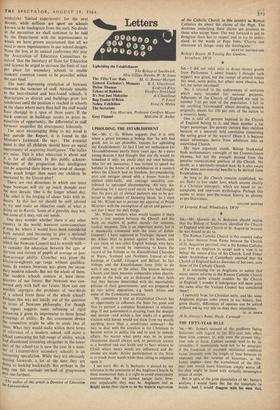41h um Letters
• Upholding the Establishment
The Bishop of Southwark, Miss Gillian Hawtin, W. N. Jones
The Fifty-Year Rule M. G. Bonner-Morgan General Gorbatov's Memoirs B. L. Glazebrook Dylan Thomas Keidrych Rhys Echoes of Robbins Geoffrey Strickland It's Not Just Makarios A. Cleanthous Bog-Trotter O'Brien P. Fewel Nehru Exhibition limn N. Mehta The Sectarians
Eric Mouram, Professor Geoffrey Moore
Grey Flannel Malcolm IL Archer
UPHOLDING THE ESTABLISHMENT
SIR,—Mr. C. G. Wilson suggests that it is only when a priest becomes a bishop that 'he will find good, not to say plausible, reasons, for upholding the Establishment.' In fact I lost my enthusiasm for Disestablishment nearly thirty years ago. As a naive young deacon 1 had thought that our ills would be remedied if only we could elect our own bishops. Alas for my innocence, I was invited to spend my holiday in the house of an archdeacon in a country where the Church had its freedom. Jerrymandering, plot and intrigue spiced with a bonne 'macho of clerical tittle-tattle, and conjugal anecdote con- tributed to episcopal electioneering. All very dis- illusioning for a starry-eyed curate who had thought that the pure air of clerical parlours was to be pre- ferred to the odours of Downing Street. So 1 must ask Mr. Wilson not to partner my approval of Prime Ministers with. the assumption of apron and gaiters— not that I wear the daft things.
Mr. Wilson wonders what would happen if there were a real tension between the Church and the State on matters of public morals--for instance, nuclear weapons. This is an important point, but is it necessarily connected with the issue of Estab- lishment? 1 have appeared in Trafalgar Square and the Albert Hall to protest against the bomb, and I can think of two other English bishops who have joined me. It would be Interesting to know the record of the bishops in the disestablished Churches of Wales, Scotland and Northern Ireland at the hustings of Cardiff, Glasgow and Belfast. In fact bishops and the Establishment have little to do with it one.way or the other. The tension between Church and State becomes unbearable when church- people in the bulk are so dedicated to their faith that they become dissatisfied with the materialistic policies of their governments, and are prepared to go into active opposition, e.g. South Africa and some of the Communist countries.
My contention is that an Established Church has an opportunity to influence the State for good and thus to prevent a complete breakdown in relation- ship. If our government is straying from the straight and narrow—and within a few weeks of a general election wild horses would not draw from my mouth anything more than a conditional sentence! —the way to deal with the situation is for Christians to become active in public life and to seek- to remedy affairs. No matter what party may be in power churchmen should always seek to penetrate society at a hundred and one levels and to bear witness to Christ where men's minds are influenced and de- cisions are made. Active participation in the State is so much more worth-while than sitting in judgment upon it.
I am sorry Mr. de la Bedoyere is pained by my reference to the continuity of the Anglican Church. In these ecumenical days it is right to avoid unnecessary controversies. But we cannot escape facts, how- ever unpalatable they may be. Anglicans feel as deeply about their claim to be the historic expression of the Catholic Church in this country as Roman Catholics do about the claims of the Pope. The doctrines underlying these claims are precious to those who accept them. The way forward is not to denigrate them but to respect and to try to under- stand. In the words of Pope John, 'Charity can overcome all things—even the theologians.'
MERVYN SOUTHWARK
Bishop's House, 38 Tooting Bee Gardens. Streatham, SW16


































 Previous page
Previous page